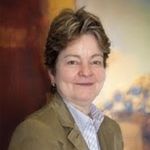CENTER FOR ETHICAL ORGANIZATIONAL CULTURES
←
→
Page content transcription
If your browser does not render page correctly, please read the page content below
2022 – 2023
CENTER FOR ETHICAL
ORGANIZATIONAL
CULTURES
Harbert College of Business
Auburn University
Note from the Director
O.C. Ferrel l , Ph.D . | Ja mes T. Pu rsel l S r. E mi nent S c ho l a r i n E t hi c s
The Center for Organizational Ethical Cultures focuses on the
development of ethical leadership, providing resources and activities for
students, faculty, and other stakeholders. The National Association of
State Boards of Accountancy (NASBA) Center for the Public Trust
student chapter is sponsored by the Center. This student organization
sponsors two speakers each semester for all Harbert students, attracting
hundreds of student attendees. Faculty teaching resources on ethical
leadership include cases, behavioral simulations, and debate issues. The
Center supports and encourages academic publishing and trade articles
on issues related to ethical leadership. Now, all Harbert students have
access to the NASBA Center for the Public Trust Ethical Leadership
Certification. This newsletter highlights some of our recent activities.Student Center for the Public Trust
Au d rey Po o rma n | M .B .A. | Au bu rn U ni v ersi t y Cha p t er Presi d ent
I am pleased to serve as the Auburn Student Center for the Public Trust
(SCPT) president this fall, along with our faculty advisors O.C. and Linda
Ferrell. Membership in our organization affords you opportunities to engage
with faculty, local leaders, and executives to learn and develop skills in ethical
leadership. You also gain access to trainings and certifications that will set
you apart from other potential job candidates when you begin internship and
career searches. We are eager to continue growing SCPT and provide more
engaging speakers and networking events.
How to Join Being a Difference Award
Each year, NASBA SCPT chapters across the country
honor one student and faculty member on their
Search for respective campuses with the Being a Difference
Award. The award recognizes those who have had a
Auburn positive impact on the school by displaying ethical
behavior, integrity, and leadership. Auburn’s SCPT is
pleased to celebrate our 2021–2022 Being a
SCPT on Difference Award recipients, Ricardo Garcia and Dr.
Michael Kincaid. Both recipients exhibited strong
AUInvolve! community leadership and were commended by fellow
students and faculty for their dedication to ethical
behavior. The 2022–2023 Being a Difference Award
will be open for nominations in the spring.
T h u r s d a y , S e p t e m b e r 2 9 th | 5 : 0 0 | L o w d e r 1 1 3 - A
Upcoming Guest Speaker
Al fo nz o Al exa nd er | T h e T r u l y S u s t a i n a b l e L e a d e r s h i p
Join us in welcoming the Chief Ethics & Diversity Officer of the National
Association of State Boards of Accountancy (NASBA) and President of
NASBA’s Center for the Public Trust (CPT). Alfonzo oversees strategic
diversity initiatives, ethics, compliance, and facilitates special projects with
the CEO. Under his leadership, the CPT has cultivated new partnerships and
nearly 100 campus programs. Distinctive to the Harbert College of Business
experience, his leadership established the Ethical Leadership Certification &
Training Programs, while advancing the Being a Difference Award.Guest Speaker Series
N i c o l e S herw i n | G rego ry Ja c kso n | S c o t t Pen t o n | Jeff S t i l l w el l
April 2022 | Athletic Compliance & Student-Athlete Advocacy
As the Assistant Director of Compliance at Auburn University, Nicole
Sherwin addressed the hot topics of Name, Image, Likeness (NIL) and the
Transfer Portal. Highly knowledgeable in each bylaw and the relationship to
ethical conduct through each layer, she addressed her obligation to student-
athletes, coaches, the department, Auburn University, and our community.
March 2022 | Supply Chain Recycling & Circular Economy
As the founder and CEO of Groundz Recycling and Urban Farmer, the
world's first organic waste recycling company for supplying urban farm
composting, Greg Jackson addressed his innovative model, which recycles
organic waste such as coffee grounds and eggshells, converts the matter to
compost, and distributes the compost to urban farms. He is also launching a
bird-friendly cocoa certification program.
November 2021 | Human Rights: Dilemmas & Opportunities
As an analyst in Deloitte’s Sustainability and Climate Change team, Scott
Penton discussed human rights as deriving from the mere existence of an
individual, despite the halting of corporate human rights and sustainability
initiatives amidst the pandemic. Moreover, Scott illuminated modern slavery
and its existence as the exploitation of people for personal or economic
benefit.
October 2021 | Reeling-In” Sustainability Initiatives
As President of Salt Life, Jeff Stilwell discussed optimizing the challenge of
balancing shareholder value creation while still prioritizing environmental
welfare. With a broad range of end-user consumers, Salt Life has effectively
branded to unite diverse interests under the common goal of preserving our
oceans, leveraging financial success to further its sustainability initiatives for
utmost impact.Featured Article
G rego ry Ja c kso n | G ro u nd z R ec y c l i ng & U rba n Fa rmer CE O
Groundz Recycling Organics with Auburn University
Urban Farmer’s Ben
Franklyn moving
5-gallon buckets of
coffee grounds into
topsoil mix
Groundz Recycling began working with Rubicon, Starbucks' official sustainable technology waste
recycling partner, who has given us resources to first identify corporate Starbucks locations across the
State of Alabama. Groundz would work with Starbucks to connect nearby locations of Auburn
University’s cotton fields and farms, and with Auburn University's Extension program to cover the rest of
the State of Alabama through possible existing partnerships like with the Alabama Cooperative Extensive
System.
Students and faculty would work with Groundz to pick up and deliver coffee grounds and coffee waste
from Starbucks to farms, community gardens, and ACES partner sites for making compost, mixing with
onsite agricultural byproduct waste.
To get started Groundz repurposed 5-gallon food-grade buckets, mostly from restaurants that throw away
a seemingly endless supply of buckets and lids that once contained food like pickles or Dunkin Donuts
donuts. Auburn University would go to restaurant owners—who will gladly supply free 5-gallon buckets
and lids—or the University’s kitchen.
Do not be surprised if the campus community and the public ask, “Where can I buy some of your
compost?” We often receive these requests and fill compost with extra 5-gallon buckets. Some customers
have us deliver 5-gallon bucket orders or fill their containers upon delivery. The buckets are reused for
future order fulfillment. At the end of the day, all this waste is not destined for trash bags and landfills but
is instead replenishing University and partner sites or even your own backyard garden.Featured Article
L i nd a Ferrel l , PH. D . | R o t h Fa mi l y Pro fesso r o f
M a rket i n g & B u si n ess E t hi c s
Harbert College Requires Ethical Leadership Certification
for Graduates
Auburn University’s Harbert College of Business now requires all students to complete a new course in
business ethics and pass an independently administered ethical leadership certification prior to
graduation. The certification will be conducted by the NASBA Center for the Public Trust. The new
requirements are designed to better prepare young professionals to handle the ethical dilemmas they will
face in their careers.
According to Alfonzo Alexander, ethics and diversity officer of NASBA and president of the Center for
the Public Trust, Auburn is the first university in the country to require its business school graduates to
complete ethical leadership training and attain independent certification. The new course and curriculum
were developed by a panel of leading business ethics professors from across the country, including Drs.
O.C. and Linda Ferrell from Auburn’s Harbert College of Business, as well as NASBA’s Alexander.
According to O.C. Ferrell, James T. Pursell, Sr. Eminent Scholar in Ethics and Director of the Center for
Ethical Organizational Cultures at Auburn University, instilling ethical conduct is critical to shaping
organizational culture in today’s highly competitive business environment.
Students are required to complete the online certification program’s six modules and pass an exam at the
conclusion of each section. Read the full article to learn more.
Thank You
Au d rey Po o rma n | N ew sl et t er E d i t o rYou can also read



























































